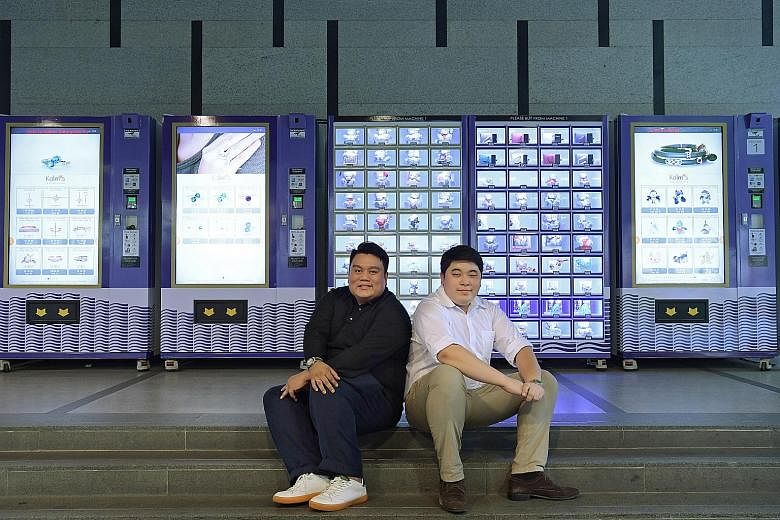Even though the gift-shop chain shut its last four stores last year, Kalms remains in the retail business with the help of vending machines.
High rental and manpower costs had forced Kalms out of the bricks-and-mortar space, but that did not spell the end of the brand, which had 10 stores at its peak.
Since last November, the brand, which started as a record store in 1964 before transforming into a household name for greeting cards and gifts in the 1980s, has launched clusters of "automated retail machines". The machines, at seven locations including in Raffles City and International Plaza, have about 70 per cent lower operating costs than a retail store.
It is not alone. Bricks-and-mortar retailers are increasingly turning to vending machines as a more cost- effective way of maintaining and scaling their physical presence.
Mr Otto Park, Fuji Electric Asia-Pacific's vending machine product manager, said there are an estimated 20,000 vending machines in Singapore, of which about 30 per cent are made by Fuji Electric.
Only about 10 per cent of Kalms' bricks-and-mortar inventory is available at its 25 machines, including plush toys, jewellery and electronics. But the benefits "far outweigh the benefits of operating a retail store", said Kalms' operations manager Masataka Mukai.
Lower costs and greater flexibility, for example, allow the machines to be set up and relocated quickly. The machines' monitoring system also means that stock can be replenished more efficiently.
Mr Mukai said: "We used about 18 sq m of space, compared with the 250 sq m of (store) space previously, to generate about 50 per cent of our previous turnover in the first five months of our operation."
By the year's end, Kalms plans to roll out 200 machines in other locations, while it maintains a "gallery" in Kallang offering its full range.
Mr Kegan Tan, owner of sporting goods retailer Crazybadman, also shuttered his store at Tampines Safra last December to focus on online and vending platforms. "I saw a lot of repeats in daily purchases, so I put those into a vending machine outside the store and saw a marginal growth in revenue," he said.
After trialling the machine for a year, Mr Tan decided to close his store and move the vending machine, which sells items such as healthy snacks and drinks, towels and shuttlecocks, to a void deck near the upcoming Tampines East MRT station.
Unmanned convenience stores have also been riding the wave, with two launched at the Metropolitan Y hotel and Singapore Management University this year. Food, drinks and other daily necessities are housed in glass "cabinets" by ShelfX Singapore, an automated retail technology distributor.Founder Serene Loong said the firm is in talks with a supermarket and convenience store chain to trial its cabinets.
Singapore Polytechnic senior lecturer in marketing and retail Amos Tan said that vending machines can help to reinvent retail space, if they are well-utilised and well-located.
"It's a very flexible platform, you don't need a lot of space and inventory can be centralised in the cloud.
"But for it to work, people have to embrace vending as a new shopping channel."
Enterprise development agency Spring Singapore said such automated retail solutions are in line with the transformation of the industry, and interested retailers can work with Spring to adopt them.


